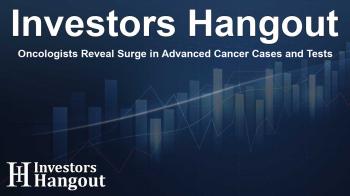Oncologists Reveal Surge in Advanced Cancer Cases and Tests

Oncologists Concerned About Rising Advanced Cancer Cases
Recent insights into the landscape of oncology reveal a concerning trend that oncologists are recognizing — they are encountering more patients with advanced cases of cancer. According to a survey, an overwhelming 76% of oncologists express alarm at the increase in advanced cancers, with many attributing this rise to barriers in screening processes. Furthermore, the report sheds light on recurring themes — missed opportunities for early detection due to shortcomings in current screening methods.
Key Barriers to Early Cancer Detection
The survey conducted among oncologists points to several barriers that hinder effective early detection of cancer recurrences. One major concern is patient compliance: approximately 68% of oncologists noted that missed or delayed follow-up care contributes significantly to missed cancer recurrences. Additionally, many oncologists (50%) feel that imaging tests are not efficient enough in detecting cancer recurrence at earlier stages, indicating a gap that needs urgent attention.
Challenges with Current Monitoring Techniques
Despite the understanding of these barriers, oncologists feel frustrated by the limitations of existing technologies. Traditional monitoring methods such as PET scans and MRIs, while valuable, often miss early signs of cancer recurrence. Interestingly, a significant 94% of oncologists believe that emerging techniques such as circulating tumor DNA (ctDNA) minimal residual disease (MRD) testing hold promise to address these challenges, although hurdles remain for broader acceptance in clinical practice.
The Anxiety of Cancer Recurrence
For many patients, the psychological burden of a cancer recurrence can be daunting. The survey highlights that 87% of oncologists acknowledge that anxiety related to cancer recurrence is one of the most significant challenges facing these patients. This emotional strain underscores the critical need for better support systems and follow-up care protocols in oncology.
The Importance of New Testing Innovations
Amidst these challenges, innovative testing methods are on the rise. The newly launched Haystack MRD test represents a breakthrough in ctDNA testing. Oncologists appreciate the potential of MRD testing, but many cite a need for greater clinical evidence and broader insurance coverage to encourage more widespread usage. This illustrates a landscape poised for evolution as advancements in technology and methodologies offer hope for those navigating the complexities of cancer treatment and monitoring.
Anticipated Growth in Cancer Cases
As we look forward, it's projected that new cancer diagnoses will surpass 2 million in the near future, indicating a consistent upward trend. The number of cancer survivors is also expected to rise sharply, from 18.1 million to an anticipated 26 million over the course of the next couple of decades. This transformation in the epidemiology of cancer demands both a robust healthcare response and an urgent re-evaluation of monitoring tools and techniques.
Future Directions and Clinical Implications
The findings of this survey compel a renewed focus on enhancing early detection strategies and improving the overall cancer care continuum. With 89% of surveyed oncologists suggesting that MRD testing should be a staple in managing follow-ups for cancer recurrence, there is a clear call to action for healthcare providers and policymakers alike to foster tools that leverage the latest advancements in technology.
Frequently Asked Questions
1. What percentage of oncologists see more advanced cancers?
A significant 76% of oncologists report seeing an increase in advanced cancer cases.
2. What are the barriers to early cancer detection?
Missed follow-up care and inefficient imaging tests are key barriers identified by oncologists.
3. How do oncologists view ctDNA MRD testing?
Most oncologists believe ctDNA MRD testing could enhance early detection, but they face adoption challenges.
4. What psychological impact does cancer recurrence have on patients?
Most oncologists indicate that anxiety over cancer recurrence is a major concern for patients.
5. What is the future outlook for cancer cases in the U.S.?
New cancer diagnoses are expected to exceed 2 million annually, highlighting an urgent need for improved cancer care strategies.
About The Author
Contact Lucas Young privately here. Or send an email with ATTN: Lucas Young as the subject to contact@investorshangout.com.
About Investors Hangout
Investors Hangout is a leading online stock forum for financial discussion and learning, offering a wide range of free tools and resources. It draws in traders of all levels, who exchange market knowledge, investigate trading tactics, and keep an eye on industry developments in real time. Featuring financial articles, stock message boards, quotes, charts, company profiles, and live news updates. Through cooperative learning and a wealth of informational resources, it helps users from novices creating their first portfolios to experts honing their techniques. Join Investors Hangout today: https://investorshangout.com/
The content of this article is based on factual, publicly available information and does not represent legal, financial, or investment advice. Investors Hangout does not offer financial advice, and the author is not a licensed financial advisor. Consult a qualified advisor before making any financial or investment decisions based on this article. This article should not be considered advice to purchase, sell, or hold any securities or other investments. If any of the material provided here is inaccurate, please contact us for corrections.

